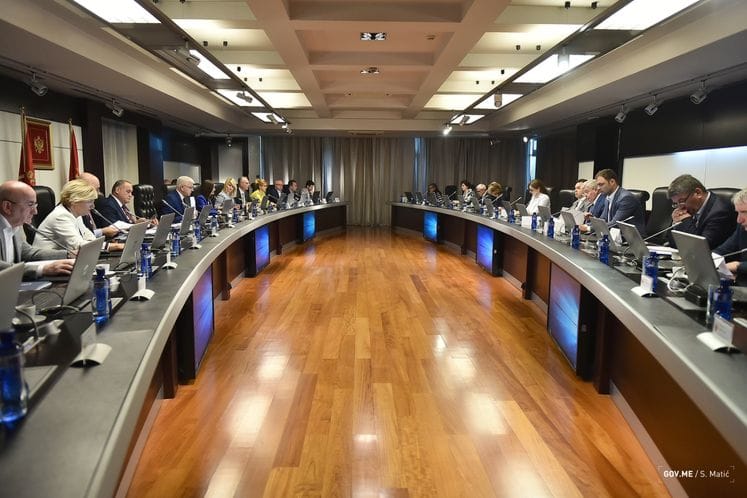- Government of Montenegro
Competitiveness Council discusses several laws tha...
Please note: The page below represents the archived content relating to the previous Government of Montenegro. Some of the information might be inaccurate or outdated.
Archive
Competitiveness Council discusses several laws that have impact on business environment: All recognised business barriers should be eliminated

Published on: Jul 3, 2019 • 10:00 PM Author: PR Service
At today's session, chaired by Prime Minister Duško Marković, the Competitiveness Council discussed several prepared laws that have an impact on the business environment and assessed that it is necessary to eliminate all recognised business barriers in order to increase competitiveness and further development of the Montenegrin economy.
Council members from the business community – the Chamber of Economy of Montenegro, the American Chamber of Commerce in Montenegro, the Foreign Investors Council, the Montenegrin Employers Federation and the Montenegro Business Alliance – evaluated as positive the proposed texts that harmonize the activities with the EU legislation and put forward several suggestions for further improvement of the proposed regulations. The Council tasked the competent ministries to consider the comments submitted by business associations.
The Proposal of the Law on Public Procurement introduces a centralized electronic public procurement system, reduces formalism, business barriers and the cost of bid preparation in such a way that the fulfillment of the conditions for participation in the public procurement procedure is proved by the "Statement" of the economic entity and establishes, in accordance with the EU directives, the most economically advantageous offer as the only selection criterion.
The President of the Council, concluding the discussion on this agenda item, assessed that the proposed text represents an important step forward, but requested further work on the text in order to prevent any possible misuse of the public procurement procedure that had not been treated by the previous law.
The Proposal of the Law on Roads regulates, in accordance with the EU legislation, conditions and ways of road management, their protection and maintenance, as well as the sources and ways of financing, and in particular the conditions for road construction and reconstruction and inspection supervision.
The Council discussed the manner and the system of determining the fees arising from the law, which are paid by the economic entities. It was agreed to hold another set of consultations between representatives of the competent ministry, employers federation and the Union of Municipalities.
The Council discussed the Proposal of the Law on Amendments to the Law on Road Transport, initiated by taxi associations aimed at combating the grey economy in this area and the Suggestions on the Draft Law on Vocational Rehabilitation and Employment of Persons with Disabilities sent by the Employers Federation, suggesting that the rate of special contribution to the employment of persons with disabilities for an employer with 20 to 50 employees should be reduced from 20 to 10 percent. The Council instructed the Ministry of Labour and Social Welfare to consider the initiative and try to harmonize it with the proposer and representatives of associations of persons with disabilities.
Considering the material of the Employers Federation regarding the employment of foreigners - non-residents and Information on the application of the Law on Foreigners and the work permit, the Council instructed the Ministry of the Interior to consider proposed suggestions from the Administration for Inspection Affairs related to the Law on Foreigners and invited the competent authorities, inspection services, to make additional efforts in order to promptly eliminate the identified challenges.
The Council discussed the Review of the Grey Economy by the American Chamber of Commerce which found that unfair competition produced by the informal economy is a serious obstacle that negatively affects the business environment in Montenegro and that business people who regularly do business and regularly fulfill their obligations towards the state are in an unequal position in relation to those who operate in the grey zone. Accordingly, it was suggested that the focus should be placed on monitoring the undertaken control activities of entities that are not registered.
The Council discussed the Analysis of the situation in the field of company registration with the measures of improvement. The Council estimated that the Central registry of business entities should continue to exist within the Tax Administration until the establishment of the possibility for full electronic registration of companies, after which conditions should be created for establishing a special agency for registration of a company in accordance with European and regional practice.
The Council discussed the Information on the involvement of the private sector in the adoption of regulations at the local level, which states that almost all units of local self-government define economic development as one of the priorities of development and that six units have begun the process of certification of cities with a favourable business environment. The Council pointed to the need for more active engagement of local self-government units in the process of creating a favourable business environment.
PUBLIC RELATIONS SERVICE OF THE GOVERNMENT OF MONTENEGRO
PHOTO: https://flic.kr/s/aHsmEKfpE7
Related articles:
Presidents of northern municipalities: The Emirates and Alabbar are welcome in Montenegro Mar 24, 2025
Statement by Deputy Prime Minister Aleksa Bećić Mar 24, 2025
Is this page useful?
